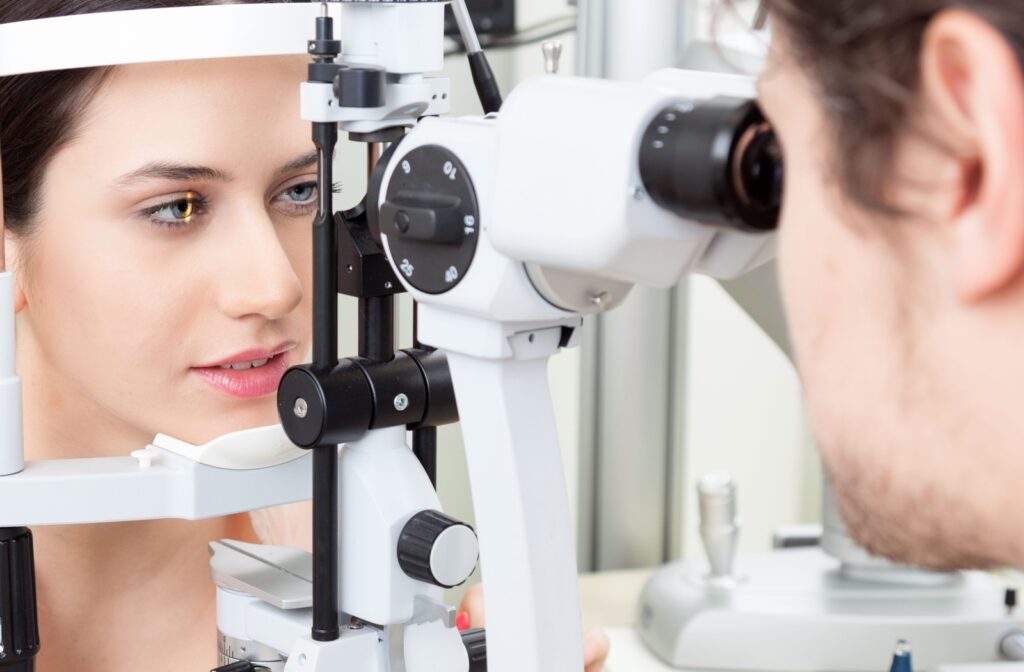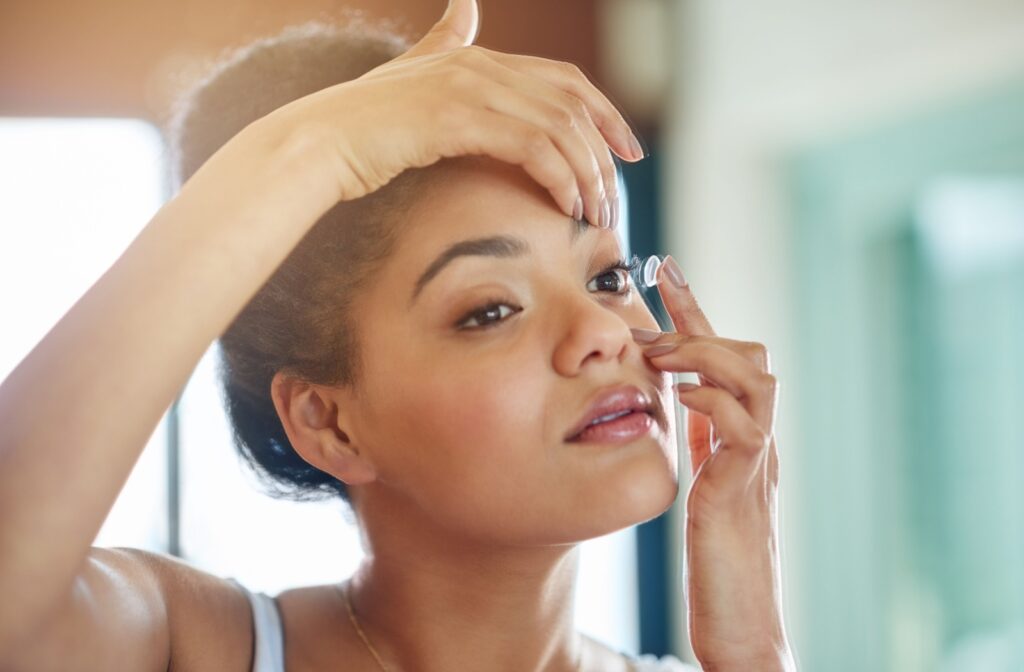Contact lenses are a convenient alternative to eyeglasses. They provide a seamless solution for athletes and active people, correct peripheral vision, and allow greater freedom of movement.
When worn and cared for properly, wearing contact lenses every day is safe. However, depending on your eye health and the way you care for your lenses, overusing contact lenses may come with risks.
The Good Side of Wearing Contacts Every Day
Glasses can fog up or get in the way during physical activities, but contact lenses provide a convenient alternative. It’s also a viable option for those who don’t like the feed or aesthetic of eyeglasses full-time.
From a medical perspective, modern contact lenses are designed to be safe for regular use. Soft lenses, especially daily disposables, are manufactured with materials like silicone hydrogel that allow greater oxygen flow to the cornea, minimizing the risk of oxygen deprivation in the eyes. When worn as directed by your eye care provider, these lenses are typically safe and comfortable for daily use.
Risks of Daily Contact Lens Use
Despite the benefits, wearing contacts every day isn’t without risks. Some common eye health concerns include:
Dry Eye Syndrome
Wearing contacts can lead to dryness, especially if you spend prolonged hours in air-conditioned environments or staring at screens. Contacts can disrupt the natural tear film and cause discomfort, making it harder for the eyes to stay lubricated.
However, there are suitable contact lenses to help minimize dryness. A contact lens exam and fitting can help you find the right lenses to suit your personal needs.
Oxygen Deprivation
Although modern lenses are designed to be more breathable, extended wear can still reduce the amount of oxygen that reaches your eyes—especially when you fall asleep while wearing regular contact lenses.
This can lead to corneal hypoxia, a condition that may result in inflammation, swelling, and infections.
Corneal Ulcers & Eye Infections
Improper handling, lack of lens cleaning, or over-wearing your contacts can introduce bacteria and irritants to your eyes. This increases the risk of serious infections like keratitis (inflammation of the cornea). These infections can be painful and, if left untreated, may eventually cause long-term damage to your vision.
Allergic Reactions
Some people develop sensitivities to cleaning solutions or deposits that build up on contact lenses over time. This can lead to reactions like redness, itching, or swelling.
The Role of Proper Hygiene & Eye Care
One of the primary reasons people experience issues with contact lenses is poor hygiene habits. Here are some golden rules to follow:
- Always wash your hands before handling your lenses to avoid introducing bacteria.
- Replace your lenses as directed (daily, bi-weekly, or monthly) to minimize debris and bacterial buildup.
- Clean and store reusable lenses in fresh, sterile solution—not water.
- Avoid wearing lenses while sleeping unless they’re specifically approved for overnight use.
- Regularly replace your contact lens case to prevent contamination.
Neglecting these simple practices can lead to complications, even if your contacts are otherwise fit for daily use.

Importance of Regular Eye Exams
Even if your eyes feel fine, annual eye exams are essential for anyone who uses contact lenses. Contact lens exams and fittings can help you find lenses that fit correctly. Your optometrist can offer individualized advice on lens types and cleaning routines tailored to your needs.
These exams can also monitor for early signs of complications such as infections, corneal irritation, or dry eye syndrome—all of which can worsen without timely intervention.
Tips for Healthy Contact Lens Use
Here are some tips to ensure your eyes stay safe and comfortable:
- Stick to your wearing schedule: Follow your optometrist’s recommendations for how many hours per day you should wear your lenses. Overwearing them can exacerbate dryness and increase the risk of infection.
- Stay hydrated: Drink plenty of water and consider using lubricating eye drops (as recommended by your doctor) to combat dryness.
- Give your eyes a break: Whenever possible, switch to glasses for a few hours or days. This gives your cornea a chance to breathe and stay healthy.
- Don’t ignore discomfort: If your lenses feel uncomfortable or if your eyes are red, itchy, or watery, remove the lenses immediately and consult an optometrist. Persistent symptoms may indicate an underlying issue.
- Schedule routine eye exams: Book annual check-ups to ensure your lenses are suited to your eyes and catch any potential problems early.
Ensuring Eye Health While Enjoying Daily Contacts
Wearing contact lenses every day requires diligence and care. By maintaining proper hygiene, following your optometrist’s guidelines, and staying on top of routine check-ups, you can enjoy the convenience of contacts without compromising your eye health.If you’re experiencing any discomfort with your lenses, need a prescription update, or are ready for a comprehensive contact lens fitting, contact our team at Lake Country Optometry. We can provide personalized care and tailored advice to help you achieve your vision goals. Schedule an appointment today and take the next step toward optimal visual health!




